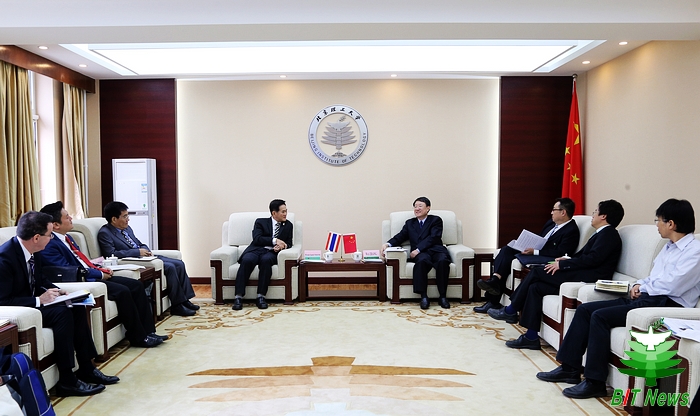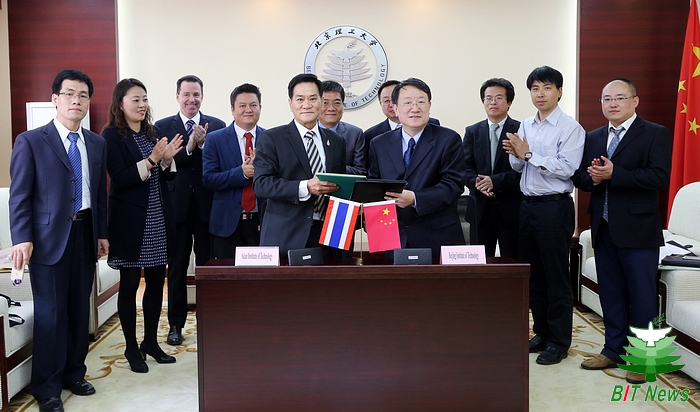
The Asian Institute of Technology (AIT) significantly expanded its relationships with universities and research institutes in China last week by signing three agreements in Beijing aimed at scholarships for Chinese students, faculty secondments from top universities in China, and potential joint academic programs for high speed railways.
In one key deal, AIT President Prof. Worsak Kanok-Nukuchai signed a
Memorandum of Understanding (MoU) with the Beijing Institute of
Technology (BIT) on 6 May 2016 for student exchanges, secondment of
young faculty members, and a combined international summer camp for
undergraduate students at both institutes.
At the invitation of Professor Zhang Wei, Chairman of the University
Council of Beijing Institute of Technology and one of AIT’s most
successful Chinese alumni (MBA 1995 & PhD 2000), President Worsak
led an AIT delegation on a visit to the Beijing-based institute for the
first time.
“Thank you for your passion in pushing forward cooperation between AIT
and BIT,” Chairman Zhang said, complimenting President Worsak. “As an
AIT alumnus, I am very happy with our new partnership.” The chairman
explained BIT’s ambitious internationalization drive which aims to
boost its current enrolment of 1,600 foreign students to 2,600 over the
next few years. “We want many more international students from Thailand
and countries around Asia,” he said.
The signing session was attended by Prof. Fang Daining, BIT Vice
President, Prof. Lan Ning, Dean of Mechanical Engineering, Prof.
Shuiyuan Tang, Director of International Affairs, Ms. Wang Ying,
Director of International Students, Dr. Lei Cong, Associate Director,
President’s Office and also AIT alumnus, Dr. Qi Chun, Associate
Professor and AIT alumna, Dr. Qingqing Xing, Associate Director of
International Affairs, and Yufeng Mao, Manager, Division of Int’l
Partnership Extension, Office of International Affairs.
The MoU stems from the mutual desire to promote academic cooperation in
science and technology, and will facilitate a raft of academic
collaborations. Specifically, the two institutes will explore not only
traditional student exchanges, but also BIT's secondment of young
‘rising star’ faculty members to AIT either as postdoctoral fellows or
visiting scholars, under the funding of China Scholarship Council
(CSC).
Already, AIT alumna Dr. Qi Chun, who is Deputy Director of Strategic
Planning and Quality Management at the BIT School of Management and
Economics, expressed interest to spend a year or two at the AIT School
of Management, following in the footsteps of her father, a former AIT
faculty member in Computer Science. Another potential activity under
discussion is a combined international summer camp for undergraduate
students hosted partly at AIT and at BIT.
BIT tabled two sets of scholarship programs designed for AIT students
to attend BIT for the academic year 2017-2018. The institute offered
three full CSC scholarships for AIT students to pursue their Master and
Doctoral degrees. It also committed to 5-10 BIT Scholarships for
Exchange students from AIT to study in Beijing for one or two
semesters. The institute also welcomed PhD graduates from AIT to apply
for postdoc programs to work at BIT.
After the signing ceremony, the AIT delegation was guided by Dean Lan
Jiang to visit a key laboratory of mechanical engineering. Accompanying
the president were Prof. Voratas Kachitvichynaukul, Dean, School of
Engineering and Technology (SET), Dr. Surachet Pravinvongvuth,
Assistant Professor of Transportation Engineering (SET), Mr. Shawn P.
Kelly, Acting Head, External Relations and Communications Office
(ERCO), Ms. Wannapa Pliansri, Royal Thai Government Coordinator (ERCO)
and Mr. Qi Xinjian, Ph.D candidate at AIT.
Beijing Institute of Technology is currently ranked by QS as the 401st
best university in the world and 80th in Asia. It was founded in 1940
as the first science and engineering university established by the
Chinese Communist Party. As a member of China’s National Key
Universities, BIT has been given priority funding from the government.
“Under the Chairmanship of Professor Zhang Wei, BIT has achieved
substantial modernization and internationalization which is expected to
be further enhanced by the new partnership with AIT,” President Worsak
said.

